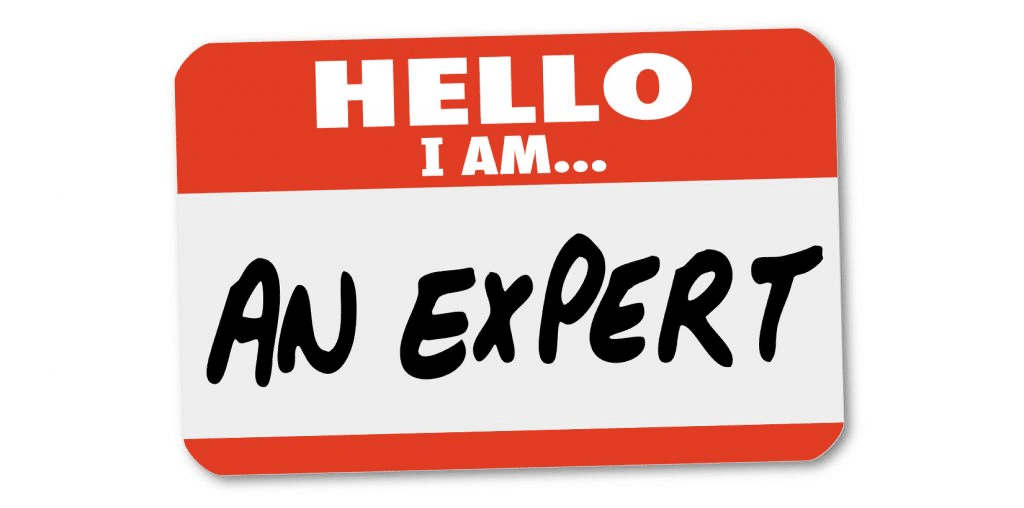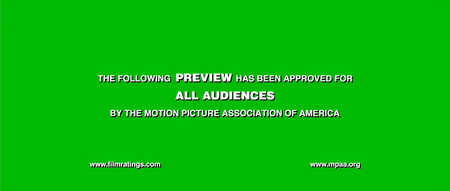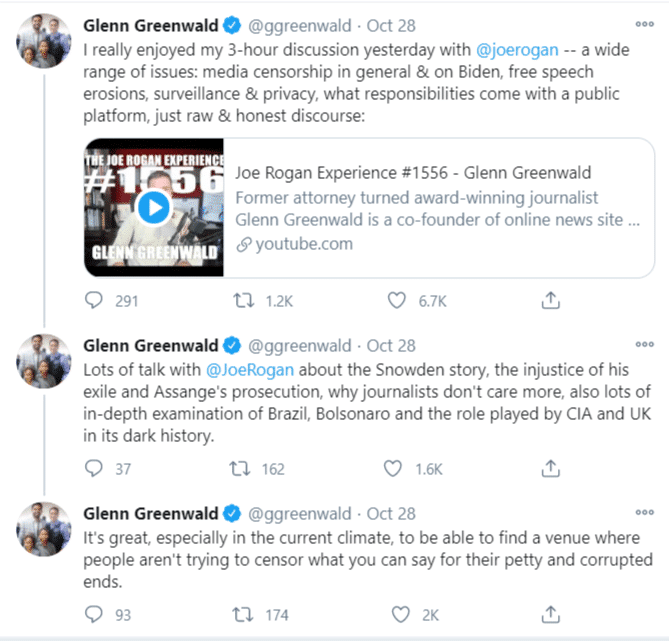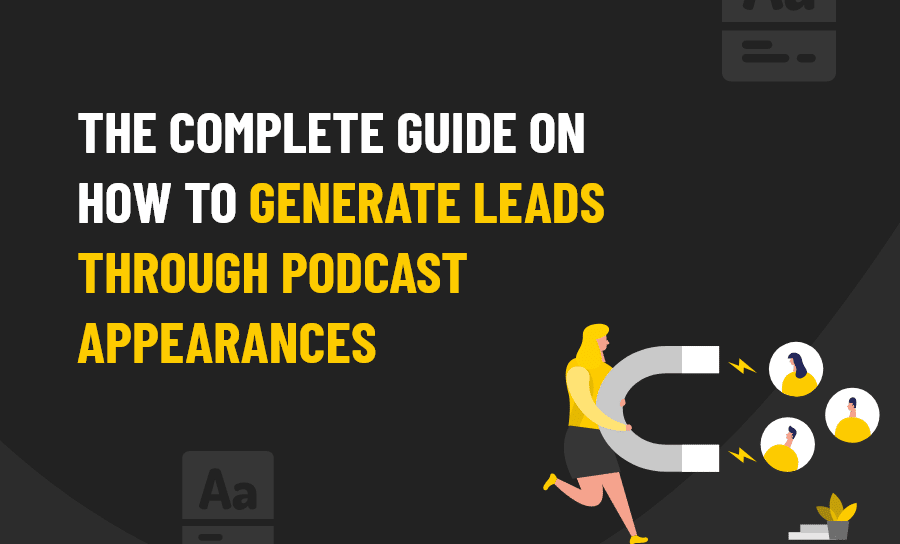
Source: flckr
Podcasting is an extremely popular form of lead generation – the process of getting people to express interest in your business.
Oftentimes, however, podcast lead generation is framed around starting your own podcast, which takes a lot of time, effort and resources.
What is less talked about is podcast lead generation through podcast appearances.
This is when you appear on other people’s podcast as a guest.
Just do a quick google search of “podcast lead generation”, and you’ll see this to be true.
Three of the top four results only talk about starting a podcast. And even the one that does mention appearing on a podcast guest does so in parentheticals, making it seem like an afterthought.

Guest appearances on podcasts can be a great way to generate leads though, and even has some advantages over creating your own podcast.
This guide will explain how and why podcast appearances generate leads, before showing you step by step how to generate leads through podcast appearances.
We’ll take you through creating an outreach strategy for scheduling appearances, show you how to maximise leads from your appearance, and tell you what to do after the episode goes live.
How Podcasts Appearances Generate Leads
Your podcast appearances are going to derive leads from three sources:
- The audience from content marketing
- The host(s)/networking
- SEO from backlinks
THE AUDIENCE AND CONTENT MARKETING

Photo credit: Pixabay
Inbound lead generation podcast is the practice of attracting people to your website or podcast to become a lead. This is the opposite of outbound lead generation, which is the process of reaching out to people to turn them into leads.
For more on inbound lead generation, check out this guide: A Beginner’s Guide To Generating Leads The Inbound Way
One form of inbound lead generation is content marketing.
Content marketing is when you create consumable content that people will discover and consume without necessarily searching for your business, leading them to your website. You can create visual content forms that generate more engagement. You can make a video, image, cards, and posters and use them for your content marketing.
The content will then (ideally) be engaging and demonstrate your value, encouraging people to explore your website further, hopefully expressing their interest and turning them into a lead.
So this is how you are going to generate a majority of the leads from your podcast guest appearance.
Easier said than done, we know. But don’t worry!
Later in this guide, we’ll go over exactly how to engage the audience and get them to your website.
THE HOST(S)/NETWORKING
The host(s) of the podcast you are going to be on can actually become a lead.
It seems so obvious but is often forgotten. But it makes sense, as they clearly see value in you; otherwise, they wouldn’t have brought you on to be a podcast guest.
This is actually how our sister company Pearl Lemon has acquired some leads.
For example, Pearl Lemon CEO Deepak Shukla appeared on the Militree’s Blogger Genius Podcast, and they became a client of Pearl Lemon.

Source: MiloTree
From there, you can also use the host to expand your network.
The podcast host has interviewed tons of other people and will continue to interview more, meaning they will know influential people in industries and fields that align with your business.
The podcast host can connect you to these people who can become potential clients, customers, or people you can work with or learn from, thus expanding your network.
Even if the podcast host doesn’t put you in direct contact, you can reach out to his other guests on LinkedIn and use the fact that you were both featured on the same podcast as a way to start a conversation.
There is also the potential that they know other podcasters and can get you more podcast guest appearances.
SEO THROUGH BACKLINKS
Podcast backlinks are a crucial aspect to improving SEO, or search engine optimisation: the process of getting a website to rank high on a search engine result page.
A backlink is a link on an external domain that, when clicked on, sends the user to your site. The more podcast backlinks on other domains that go to your site, the higher your site will rank, because search engine’s algorithms interpret them as approval from other sites.

Source: Backlinko
When you appear on a podcast, you will typically get a link to your website in the episode description, improving your website SEO, making it more discoverable and likely to generate leads.
You could also potentially get links to:
- Other content
- Your Twitter
- Your LinkedIn profile
Why Podcasts Are Great For Lead Generation
Now that you understand how podcast appearances generate leads, we are going to talk about aspects of podcasting that makes it the perfect form for lead generation podcast.
Then, we’ll highlight the advantages that appearing on a podcast has over starting your own podcast.
Knowing this will allow you to take full advantage of your appearances so you can maximise your leads.
Podcasting Has A Massive Audience
Everyone and their mother is listening to podcasts.
6.5 million adults in the UK listen to podcasts weekly.
And about 90 million people in the United States listen to podcasts once a month.
This audience isn’t going away either.
In the US, the percentage of the population who have listened to podcasts has been steadily growing over the past 14 years.

Source: Nielson
That means there are tons of people out there just waiting to become a lead.
Entertaining
With content marketing, you want your content to be informative, but also entertaining and engaging to hold people’s attention.
If your content is boring, people will leave, and you won’t get a lead out of it.
While any content has the potential to be entertaining, the form and nature of podcasts lend themselves to be more entertaining because:
- For some reason, people love listening to other people’s conversations. Outside of podcasting, just think about how popular talk shows like The Graham Norton Show are.
- Podcasting typically allows for more casual and free-flowing conversations which are more interesting to listen to than formal lectures or interviews.
In fact, “to be entertained” is the number 2 reason people listen to podcasts according to Statista.
Passive
With blogs and most other forms of content, people have to READ.
Which is like, a lot of work. I’m surprised you made it this far.
No, seriously.
55% of people spend fewer than 15 seconds actively on a page, meaning that a majority of your visitors aren’t reading your content.
In comparison, listening to a podcast is a much more passive act, meaning people are probably more likely to hear what you have to say.
You put headphones in, press play, and let it run.
That’s it.
Personal
Blogs or videos have a natural barrier that is your computer screen, reminding people that you aren’t there.
Podcasts, on the other hand, bring your voice right into their ear, making it feel like an intimate connection where your audience is getting to know you.
It is also easier to show your personality with podcasts.
You can bring your energy and enthusiasm while demonstrating your personality in a way the written word sometimes can’t.
There will also be times where your audience can get to know you, whether that be through you telling anecdotes or just listening to how you carry a conversation.
This all helps the audience to create a much more personal connection with you when compared to other mediums, which will make them more likely to become interested in you and become a lead.
They Will Make You A Better Communicator
Being on a podcast will help your communication skills in several ways.
You will become better at:
- Being a storyteller
- Talking about your business
- Explaining your product and its benefits
- Speaking in public
- Promoting yourself
- Creating/defining your persona when it comes to your business
This can all translate to other parts of your business, such as sales pitches and networking.
Advantages Of Podcast Appearances
There Is A New Audience Each Appearance
If you were to host a podcast, you would be hitting the same audience every week.
By going on someone else’s podcast, you are tapping into a brand new group of people each appearance who may have never heard of you or your business before.
This is also an audience you might never have reached if it wasn’t for the podcast.
The more people you can reach, the better, and podcast guest appearances are a great way to spread the word about your product or service to a large and ever-changing audience.
The Podcaster Does Most Of The Work
Starting a podcast takes a lot of time and effort. It’s not as simple as calling up a buddy and recording your conversation.
With podcast appearances though, all you have to do is show up.
The podcast host is the one who went through the process of creating a show, gathering a following and buying equipment. They are also the one who is going to edit and post the podcast.
It will take a bit of work on your end to schedule podcast appearances. But after that, you’re chilling.
Free

Source: Steam
Starting a podcast will cost money.
At the least, you will need to buy some recording equipment and editing software if you want the podcast to sound good. Podcast hosting platforms usually cost money as well.
Getting onto a podcast as a guest though will cost you absolutely nothing.
That is because you will offer some sort of value to the podcast host where they will want you on their show.
Just like the bee and the flower, podcast appearances are a mutualistic relationship.
And when it comes to marketing your product, you’d be a fool not to take advantage of a free method of doing so.
How To Generate Leads Through Podcast Appearances
Alright, now for the reason you started reading this guide in the first place: your step by step guide on how to generate leads from podcast appearances!
We’ll take you through start to finish, from the outreach process to nailing your appearance and what to do after the recording ends.
Along the way, we’ll even give you little tips and tricks to ensure you get as many leads as possible!
The Outreach Process
The outreach process is where you will be finding podcasts to appear on, reaching out to their hosts and asking to be a guest on their show.
Sounds pretty simple, doesn’t it?
Unfortunately, there are a few more steps involved. But don’t worry, we’re here to tell you exactly what you need to do.
First thing you will need to do is find podcasts to reach out to.
Step 1: Determine The Types Of Podcasts You’re Looking For
You’re going to want to pick podcasts that your target customers are listening to.
So you can start by thinking about what interests your target customers have that align with your product/service type, then pick podcasts based on that.
So if you’re a property investment company, you’re going to want to look for podcasts that talk about property investment.
But again, keep your target customer in mind. You don’t want to pick just any podcast that is somewhat related to what your company does.
Let’s say you’re a company that develops software and you are promoting one you created that helps with taxes. Your target market would be tax attorneys then, not other software developers, meaning that it won’t be beneficial to appear on a tech podcast about designing software.
Yes, people may be interested to hear about your development process, but they aren’t the people who will be buying your product.
So instead, look for podcasts that a tax attorney may listen to, not a tech geek.
It will also help to be specific.
Going back to the property investing example, if you focus on finding your clients long term property investments, you might be better off finding a podcast about long term property investments, instead of just property investing in general.
Step 2: Search For Podcasts
Once you’ve figured out the types of podcasts you’re looking for, you can start searching for them.

Source: Google
Make a list of some specific keywords that relate to your ideal podcast.
For example, if you are a video/film editor and want to appear on a podcast about filming techniques, potential keywords could be:
- Video editing podcasts
- Film editing podcasts
- Video editing techniques
- Adobe Premiere shortcuts
- Podcast about how to edit videos
Get a list of at least 10 to 20 keywords and phrases, more if you can, and type them into:
- Apple podcasts
- Spotify
- Stitcher
- Google Podcasts
- iHeartRadio
- Pretty much any podcast listening platform
Go through the results and read their descriptions to make sure they line up with what you’re looking for.
Also, make sure they have listeners and a following. Going on a podcast that no one listens to isn’t going to help you.
On most platforms, you can see how many listeners and subscribers a podcast has.
You can also check out Chartable.com.
They rank podcasts relative to others in their category, and you can read reviews written by listeners.

Source: Chartable
To get an accurate measure of how many people listen to a particular podcast though, you can use a podcast analytics tool that will measure total subscribers, listeners and other advanced metrics.
Here are some good podcast analytics tools you can use:
- Blubrry
- Transistor
- Castos
- Podbean
- Podtrac
- Anchor
- Chartable
- Backtracks
- Fireside
Besides searching, you can also:
- Browse through categories related to your business on podcasting platforms
- Find popular influencers in your field that have podcasts
Do this until you have a list of at least five podcasts, but the more the better. Ideally, your list will have 10 to 20 to increase your odds of getting on one and the number of people who will hear you.
Once you have a solid list, you’re ready to start contacting the hosts.
Step 3: Find The Podcast Host’s Contact Info
Obviously, you’re going to need the contact information of the host, ideally their email address.
What isn’t always as obvious, is how to find their email address.
Start by checking the show page or descriptions on listening platforms.
You can also try checking:
- The show’s website
- The show’s social media
- The host’s social media or website
If those all fail, there are a few email retrieval tools you can try, like Hunter and Any Mail Finder.
With those, you enter the domain of the podcast website, and they will find all of the emails associated with the domain.
Step 4: Think Of Topics You Could Talk About
Now you can start coming up with some topics you can talk about on the podcasts you’ve found.
You will later use these topics as pitches when you contact the podcast host(s).
Your topics shouldn’t be “look at how great my product is.” No one is going to bring you on their podcast just to promote your business, because that’s not why people listen to podcasts.
People listen to them to be entertained or to learn something.
That doesn’t mean your product/business can’t come up. In fact, you will want to pitch topics where it will make sense to mention your business, but that shouldn’t be the premise of your pitch.
Instead, your topics should be something where you, as the guest, can bring value to the listener.
Here are two potential types of topics that will help you generate leads from your podcast guest appearance.
Topics You Are An Expert In

Source: philmjones.com
If you can prove you are an expert in your field, people will be more likely to trust your product/service.
For example, suppose you can prove that you have a deep understanding of the use of keywords for search engine optimisation. People would then be more likely to use a tool you created that helps people implement keywords onto their website.
So, make sure that the topics you pitch are ones you are well versed in.
That way, once you’re on the podcast, you’ll be able to have an in-depth discussion and display your knowledge on the subject. If possible, you should also bring something new or original to the conversation.
You could talk about a:
- New opinion
- Problem in the industry (and potentially a solution)
- Different take or angle on an existing topic
- Study you’ve done
- Analysis of a case study
Potential topics/pitches for the SEO tool example could be:
- “I found a mistake everyone makes when implementing keywords.”
- “I have a case study where I show a unique way of implementing keywords.”
For example, in the Content Champion Podcast, Loz James interviews different people about content marketing. This allows the guest to show their expertise in content marketing and demonstrate potential value to listeners.
In this episode, James interviews SEO expert Nathan Gotch about his 9 step SEO content creation process.
Tell A Story

Source: Everstring
People respond much more strongly and emotionally to stories than they do to product pitches.
A story will deepen listeners’ interest in you, making them more likely to look up you and your business, becoming a lead.
On your podcast appearance, you can talk about:
- What inspired you to be in the field you are in
- How you came up with your product idea
- Your process starting your business
- Anecdotes with lessons you’ve learned
When you pitch a story for a potential talking point for your appearance, be sure also to include why your story is beneficial for listeners to hear.
Ideally, there will be some kind of lesson in the story. A couple of examples could be:
- A mistake you made and learned from – ex: “My first company failed because I didn’t get enough investors in time, but it helped me learn how to be more persuasive in pitches to investors.”
- A change in your life – “How turning off my phone for six hours every day increased my productivity and led to me starting my property investing company.”
For an example of what this sounds like, listen to WTF with Marc Maron.
Maron interviews a lot of pretty famous people for his podcast who can be hard to relate to because of their success. But when they tell stories, these celebrities become much more personal and relatable.
In an episode where he interviews Hollywood legend Matthew McConaughey, they talk about McConaughey’s upbringing and how an “ad-lib changed his life.”
Step 5: Write An Email Asking To Be A Guest

Source: FluentU
Again, a podcast host will bring you on as a guest if they believe it will benefit them, their podcast and its listeners.
And you’re going to have to prove this in an email by showing two things:
- That you can teach something to the listeners.
- That you have an interesting and engaging personality.
Your value and what you could teach the listeners will mostly come through in your topic pitches.
Showing your personality will be a bit trickier, but just as crucial.
Think about the boring professors you have had that made interesting subjects feel like watching grass grow and the fun professors that made dry subjects bearable.
The same idea will apply to podcasts.
Below will be a basic outline for a podcast outreach email, but you should definitely personalise it and add some voice to show your personality.
You can do that by using adjectives, adverbs, punctuation and italics.
For example, instead of saying, “I would like to enquire about being on your podcast.”
You could say, “I think your podcast is super interesting and I would love to be a guest on it!”
Get a feel for what the host is like too in their podcasts so that you can cater the email to their personality as well.
The Email
Start the email by addressing the host by name. If you say something generic like “(name of the podcast) host,” the rest of the email probably won’t even get read.
Next, give the host and the podcast a little compliment. It can’t hurt to butter them up a bit. Be specific and reference a certain episode or topic discussed, so they know you’ve actually taken the time to listen to the podcast.
Then, introduce yourself. Say who you are, your job, and something specific that shows you are a person worth talking to, like “I’ve run an app-developing company for 7 years and have been a part of creating 6 apps ranked in the top 100 on iTunes.”
Pretty much something that shows you’re an expert.
Now, you can bring up that you would like to be on their podcast and a quick note on why you would benefit the podcast.
For example, you can say “I’d love to teach your audience about _____,” or “I believe I have a different opinion/new take on ______.”
Then list a few of the topics you’ve come up with, including a brief description and explanation of how they would be valuable to listeners.
Then end it with a nice little conclusion and a “thanks for their consideration.”
Here is an example outline of the above in action. But again, be sure to personalise yours so it doesn’t look generic.
Email Outline
Hi, (Name of host),
My name is (name), and I’m a big fan of your podcast (name of the podcast). I really like(d) (compliment/mention a specific episode, topic, the host’s style, anything specific, etc.)
I’m a (profession), and I have run a (business) for several years (or some other display of your expertise).
I would love to contribute to your discussion on (topic). Here are some topics I think your listeners would find interesting.
Topic 1- short description of topic and how listeners and the podcast can benefit from hearing it.
Topic 2- short description of topic and how listeners and the podcast can benefit from hearing it.
Topic 3- short description of topic and how listeners and the podcast can benefit from hearing it.
Ex: (For a podcast about writing for writers) I have a new strategy for getting through writer’s block. I’ve written a series of prompts people can use to get ideas flowing. I can also teach your audience how to come up with their own prompts.
If any of the above sounds interesting to you, send me an Email! I would love the opportunity to discuss one of these topics with you.
Thank you for your consideration,
(Name)
The Polite Follow Up
If you don’t get a response right away, don’t worry!
It may take some time. You may even want to send a polite follow-up, to show that you are serious about wanting to be a guest and that what you have to say is really important.
Don’t just send the same email though. Add something to demonstrate further why you would be a useful addition to their podcast.
You can mention:
- An article you’ve written
- Another podcast you appeared on
- Reviews and testimonials of your work
- Videos you’ve made or appeared on
- Something else you’ve published (book, white pages, etc.)
Be sure they relate to the topic(s) you want to talk about.
Wait about a week before sending a follow-up. Sending one too soon will make you seem pushy and annoying.
And if you get a hard “no” from them, don’t keep pestering them. And don’t send a ton of follow up emails. One, maybe two is enough.
Here is an outline you can use for your follow up email.
Follow Up Email Outline
Hi (Name of podcast host),
Hope you’re doing well!
I was recently on an episode of (podcast) where I talked about (topic)/ I recently wrote (or published) (Article, book, etc.) and it was about (topic).
(Briefly describe its importance and how it can add value to the podcast)
It was received really well by listeners/readers.
If you think it can be useful to talk about on your podcast let me know! I would love to schedule something.
Thanks,
(Name)
The Podcast Appearance
Alright so now you’ve got some podcast appearances scheduled. Great!
Now it’s time to nail your appearance, so the listeners find you engaging and take an interest in your business.
Here are some tips on how to be a great podcast guest, as well as a couple of strategies to make sure you don’t leave any leads un-generated.
How To Be A Great Podcast Guest
Find The Perfect Balance

Source: Wikimedia
You should definitely do some prep before you record.
You will already know a lot about the topics you proposed, but doing additional research and bringing some notes, stats and talking points will help. You can also think of potential questions the host may ask and be prepared to answer them.
Maybe even do some practise interviews with friends or colleagues.
But don’t script your performance.
Podcasts are typically conversations, so it should sound like you and the host are talking.
If you’re too scripted, it will come across as unnatural, like you’re presenting, which could turn viewers off.
And if you try too hard to steer towards or stick to certain topics, it will feel forced.
So try to find that right balance of coming prepared, but letting the conversation flow naturally.
Be Yourself
Don’t put on an act or some kind of performance.
The listeners will see right through it and you won’t come across as natural.
Just be yourself. Let your personality shine so the audience can get to know you.
This will help them build a connection and develop an interest in you, which means they’ll likely develop an interest in your company.
And this was already mentioned a bit in the section titled “Perfect Balance,” but it’s worth reiterating:
Podcasts are conversations.
So have a conversation!
Talk how you normally would with friends and colleagues, and let the conversation flow.
You don’t have to put extra effort into sounding intelligent or try too hard to be funny. Again, it will come across as forced and unnatural.
A helpful tip is before you appear on the podcast, pay attention to how you talk when you’re having a conversation with friends.
Listen to your cadence, volume, places of emphasis, and other aspects of your speech.
You don’t have to go crazy over-analyzing, but being aware of what you typically sound like will help you realise if you start talking differently while on the podcast.
Strategies To Maximize Leads
Bring A Preview To Intrigue Interest

Source: joesiegler.blog
Another way you can turn listeners into leads is to intrigue them with a preview of something new, like a:
- Product
- Service
- Business
- Book
- Video, film or documentary
Your preview shouldn’t be the only thing you talk about on the podcast (unless that’s what the host wants). But if you can, pitch topics where it would make sense for either you or the host to promote your new offering.
Let’s say you own a health supplement business, and you want to promote a new product that helps people fight fatigue.
For your appearance, you can talk about different ways to stay energised, and one of them could be your new product.
A great example of this occurs on the Entrepreneurs on Fire podcast, where John Lee Dumas talks to different entrepreneurs on a variety of topics.
In one episode, Dumas interviews Whit McCullough about how to make a highly effective PowerPoint presentation, offering several different tips. At the end though, he brings up his customisable PowerPoint template, giving the audience a preview of what his service can offer them.
Have A CTA With An Incentive
Don’t just assume people will automatically look you up after your podcast appearance.
Maybe some will on their own, but you can ensure that they do by having a call to action (CTA) with an incentive.
A call to action is a specific direction given to the audience where you tell them to complete a desired action.
In the case of your podcast appearance, you will likely want them to go to your website, ideally a page where they can leave their contact information on what is called a landing page. This will allow you to reach out and potentially convert them from a lead to a customer.
If you can, get a link in the description of the podcast episode you appear on that will send listeners to your website/landing page.
You can also incentivise your CTA by offering the listener a direct tangible benefit for going to your site.
Potential incentives could be:
- Discounts
- Free trials, lite versions or samples of a product
- An ebook
- Sample chapters of a book
There are many ways you can phrase your CTA, but one template could be, “to get the discount [or other incentive], go to our website at [website domain].”
An example for a life coach could be, “to get a free assessment and to talk about how I could help, go to my website www.lifecoachjane.com and book a call!”
For a real-life example of a podcast CTA, check out the Make It Happen Mondays Podcast, where John Barrows interviews business experts on common sales tactics.
In this episode, he interviews Charlie Locke of SDR Nation, who has a CTA at the end of the episode asking people to go to his website.
What Not To Do During Your Podcast Interview
Filler/Repeat Words
Filler words are meaningless sounds or words people use to mark a pause or hesitation in speech. Examples include:
- Um
- Uh
- Er
- Like
- You know
- Right
- Okay
- Obviously
They may not seem like a big deal during the conversation, but constantly hearing them on a podcast can get annoying very quickly, so try to avoid them.
People also have phrases they often repeat in conversation, like “you wouldn’t believe…” “And I was like, what!”
Like filler words, hearing the same phrases over and over again can get irritating.
A tip for eliminating filler and repeat words when you talk is to pay attention to yourself when you speak and listen for them. Maybe even tell your friends to let you know if they notice any.
Once you are aware of them, you can focus on gradually eliminating these in your everyday speech, like kicking a bad habit, so that way you’re ready to go once you’re on the podcast.
Don’t let this distract you too much while on the podcast though, because if you overthink it, you might get distracted and sound awkward.
No Swearing
Swearing can cause you to come across as unprofessional and turn off the audience.
This may sound obvious, but sometimes it can be hard to remember if the conversation feels more casual during the podcast, and you’re someone who swears a lot while not in the workplace.
The exception, of course, is if the host and guests on past episodes swear, but even then, it may be better to avoid it.
After Your Appearance
It’s over! You made a successful podcast appearance!
So you’re done, right?
Wrong!
If you want to continue using podcasts for lead generation and reap the benefits, there is still more to do.
Promote Your Podcast Appearance
You want people to listen to the podcast, right?
Then promote it!
Promoting your podcast appearance increases awareness of its existence and improves its searchability through backlinks, bringing it to the ears of more people who could potentially become leads!
You will also be increasing the episode’s authority among people who discover your appearance, as the number of listens is often an indicator of the quality of a podcast. This will create a bit of a snowball effect, bringing you even more listens!
When promoting your appearance, you should use multiple platforms, such as:
- Social media (like Twitter, Facebook, LinkedIn, etc.)
- Your website
- In other content like a blog
- PR releases
None of these will take a lot of effort either. Writing something simple can get the job done.
For example, you can send a tweet that says: “Hey, check out my appearance on the People’s Business’s Podcast! I discussed with host Alex Jones about starting my consulting company, and listeners can get access to an exclusive discount on their first month of my services!”
Glenn Greenwald did a great job of this for his appearance on The Joe Rogan Experience – a podcast where Joe Rogan interviews various influential people. Greenwald, a famous journalist, sent out these tweets promoting his appearance:

Re-purpose
You can also take the podcast appearance and repurpose it, meaning use it as different types of content to attract more people across different mediums.
It’s essentially using old content to create brand new content quickly and easily!
Here are some ways you can repurpose your appearance for lead generation. With any of these, you may need to ask the podcast host for permission. But seeing as these methods will help their podcast get listens, they will most likely agree.
Turn it into a blog
One option is to take what you talked about on your podcast interview and turn it into a blog. This way, you can include a link to your appearance while creating more content for your site.
Ways you can do this are:
- Share the transcript
- Talk about/promote the episode
- Summarise and/or expand on points made
Use it On Your Own Podcast
Do you also have your own podcast?
Well, then you can use your recent appearance as an episode of yours!
This is perfect for when you find yourself too busy one week to record an episode.
Just be sure to record an intro explaining the interview and where it came from, giving credit to the original podcast it appeared on.
Create Images
As a way of promoting the podcast, you can create images about the podcast, attaching quotes to:
- Images of you while on the podcast
- Infographics
- Images that relate to the quote
This world really well for platforms like Twitter, LinkedIn, Facebook and Instagram.
Turn into videos
Hopefully, the podcast host will be visually recording your conversation in addition to the audio.
But if they don’t, be sure to try and turn the podcast into a video and upload it to YouTube.
Options for videos include:
- Filming yourself while on the podcast
- Pairing animation, image, logo or audiogram to go with the audio
You can also create clips that only show parts of the interview where you are talking about specific topics.
Keep Up With The Host
After the podcast is over, you should maintain a good relationship with the host.
For starters, it will make you seem like a nice person, and not a jerk who just used them for personal gain. Building a reputation like that could hurt your chances in the future of appearing on other podcasts.
Keeping that connection can also be beneficial for you in the long run.
There is always the potential to appear on their podcast again if they liked you.
They can also help you get on other podcasts through connections and/or recommendations.
And as mentioned earlier, they could become a potential client or customer themselves, pass along listeners inquiring about you or recommend you to their friends and family.
After your appearance is over, you can start by sending a simple thank you message or email.
After that, keep in contact with them how you normally do with other people in your network.
Send them articles or videos you think would interest or benefit them, help them in their business if they have any, let them know of a recent episode you enjoyed, or just see how they’re doing every now and then.
Repeat
Now repeat!
Just take this process and continue to reach out to other podcasts.
You won’t get on all of them, but the more you reach out to, the more you’ll appear on.
Pretty soon you’ll be scheduling appearances left and right, going on a little podcast tour and generating tons of leads for your business!
For Help
And there you have it!
A complete guide, start to finish, on lead generation through podcast appearances. With this information, you are ready to start appearing on tons of podcasts!
But if you find any of this overwhelming, don’t be afraid to ask for help!
At Pearl Lemon leads, we have a ton of experience booking our clients on podcasts. So if you find yourself struggling with any part of the lead generation through podcast appearance process, contact us today!
FAQs
Your podcast is your own, so you should make your episodes a healthy balance of what you want to do and what your listeners need for it to be valuable. There may be industry specific “no nos” that may apply, but the big ones are:
-do not trash talk other companies or people
-avoid false information
-don’t give advice if it is purely opinion based
Alternatively you can always bring in a podcast agency to discuss possible scripts and what to avoid.
To do a lead generation podcast, be sure you know enough information to potentially do a series or have a lengthy enough podcast to provide value. You can also interview industry experts in order to get insights from numerous sources on lead generation techniques and best practices.
A lead in a podcast is any potential customer that may purchase your product or service due to listening to your podcast. This means people signing up for a newsletter, booking a call for a service or going to purchase a product due to the podcast.
A few ways you can generate leads for your podcast is to produce regular content that provides solutions to your listeners problems, be strategic of the use of CTAs through the episodes and written description, making all opt-ins clear and simple and more.
Additionally you can bring in a podcast lead generation team to help you ensure your episodes and site is fully optimized to bring in more leads.
Generating podcast leads starts with getting yourself on other people’s podcasts. If you are a guest speaker on industry relevant podcasts, your ideal clients may be listening in. Do some research and figure out the most popular podcasts for your prospects and do podcast outreach to become a guest. These listeners will likely view you as an expert in your field and will be more likely to give you a call for your product or service.






